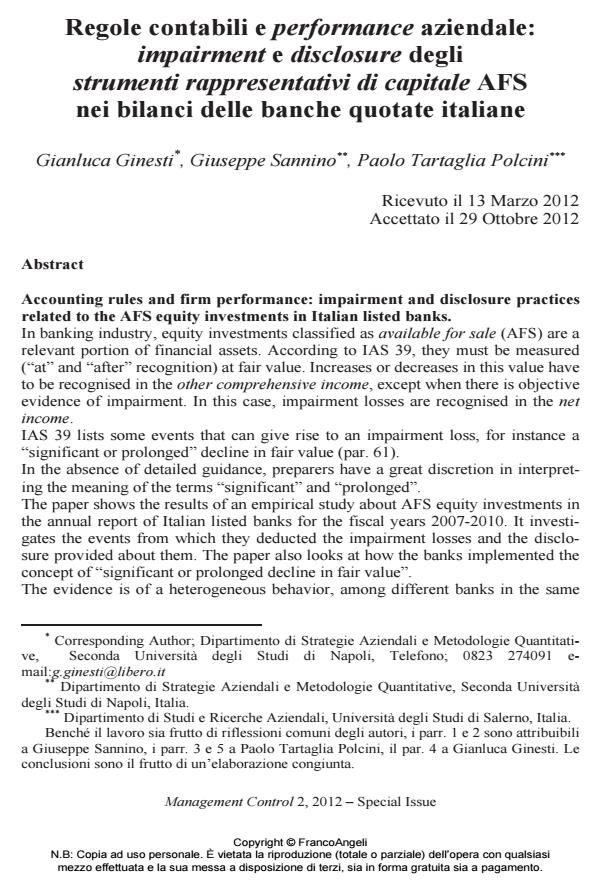Regole contabili e performance aziendale: impairment e disclosure degli strumenti rappresentativi di capitale AFS nei bilanci delle banche quotate italiane
Titolo Rivista MANAGEMENT CONTROL
Autori/Curatori Gianluca Ginesti, Giuseppe Sannino, Polcini Paolo Tartaglia
Anno di pubblicazione 2012 Fascicolo 2012/suppl. 2
Lingua Italiano Numero pagine 33 P. 71-103 Dimensione file 393 KB
DOI 10.3280/MACO2012-SU2005
Il DOI è il codice a barre della proprietà intellettuale: per saperne di più
clicca qui
Qui sotto puoi vedere in anteprima la prima pagina di questo articolo.
Se questo articolo ti interessa, lo puoi acquistare (e scaricare in formato pdf) seguendo le facili indicazioni per acquistare il download credit. Acquista Download Credits per scaricare questo Articolo in formato PDF

FrancoAngeli è membro della Publishers International Linking Association, Inc (PILA)associazione indipendente e non profit per facilitare (attraverso i servizi tecnologici implementati da CrossRef.org) l’accesso degli studiosi ai contenuti digitali nelle pubblicazioni professionali e scientifiche
In banking industry, equity investments classified as available for sale (AFS) are a relevant portion of financial assets. According to IAS 39, they must be measured ("at" and "after" recognition) at fair value. Increases or decreases in this value have to be recognised in the other comprehensive income, except when there is objective evidence of impairment. In this case, impairment losses are recognised in the net income. IAS 39 lists some events that can give rise to an impairment loss, for instance a "significant or prolonged" decline in fair value (par. 61). In the absence of detailed guidance, preparers have a great discretion in interpreting the meaning of the terms "significant" and "prolonged". The paper shows the results of an empirical study about AFS equity investments in the annual report of Italian listed banks for the fiscal years 2007-2010. It investigates the events from which they deducted the impairment losses and the disclosure provided about them. The paper also looks at how the banks implemented the concept of "significant or prolonged decline in fair value". The evidence is of a heterogeneous behavior, among different banks in the same year and through different years for the same bank. The disclosure provided to the market was poor until the Authority imposed a mandatory information. The authors formulate hypotheses about the reasons of these evidences, especially as regards earnings management policies because during the financial crisis and their impact on financial performance.
Parole chiave:Banks, Financial Instruments, Fair value, Impairment, IAS 39, Disclosure
Gianluca Ginesti, Giuseppe Sannino, Polcini Paolo Tartaglia, Regole contabili e performance aziendale: impairment e disclosure degli strumenti rappresentativi di capitale AFS nei bilanci delle banche quotate italiane in "MANAGEMENT CONTROL" suppl. 2/2012, pp 71-103, DOI: 10.3280/MACO2012-SU2005